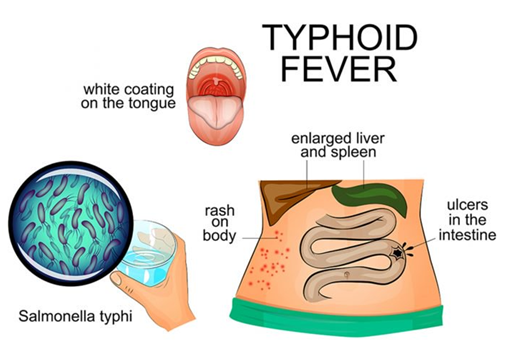
Alexander Okere
Head of Microbiology Department at Adeleke University, Osun State, Dr Oladipo Kolawole, tells ALEXANDER OKERE how typhoid fever, a common but deadly infection when untreated can be managed
What is typhoid fever?
Typhoid fever is a bacterial infection that can spread in every part of the body and affect many organs. It can lead to major problems and even be deadly without early treatment. Typhoid fever is also extremely infectious. A person who is sick can expel the germs from their body through their faeces or, less frequently, through their urine.
Globally, children are thought to be the most threatened of developing typhoid fever. This may be because their immune system, the body’s natural defence against infection and illness, is still developing. However, children with typhoid fever tend to have milder symptoms than adults. Yet merely exercising caution is necessary; there’s no need to grow an unhealthy dread of typhoid.
What causes the illness?
A bacterium called salmonella typhi causes typhoid fever. Other strains of this salmonella bacteria cause a similar disease called paratyphoid fever. In locations where outbreaks are frequent, people are more likely to contract the pathogen. In the urine and faeces of those who are infected with the bacterium, the bacteria exit the body. Bacteria can spread from hands to items or other people if they aren’t thoroughly washed after using the restroom.
It can spread through fresh fruits without skin and other uncooked foods. One can get infected through sources where the water hasn’t been disinfected to destroy germs. This includes consuming unpasteurised milk, juice, or untreated water to make ice or to drink water. A person who has the bacterium can also transmit it to others, however, it is still with a connection to faeces, especially when their hands are not properly washed after using the toilet. A healthy carrier is a person with an unobvious infection who is capable of transmitting the pathogen to others. In simple terms, these are people who may never experience symptoms despite being infected.
What are the symptoms?
Symptoms are probable to start gradually, usually showing up one to three weeks after contact with the bacteria. The early symptoms include a fever that starts low and increases throughout the day, possibly reaching as high as 104 degrees Fahrenheit (40 degrees Celsius); chills, headache, weakness, and fatigue. Others are muscle aches, stomach pain, diarrhoea or constipation, and rash.
In early cases of the disease, people may also have a cough, loss of appetite, and sweating. In later times of the illness, a few weeks after symptoms start, the illness can cause problems in the intestines. People may have stomach pain, a very swollen stomach, or an infection caused by gut bacteria spreading throughout the body, called sepsis.
In very serious cases, people may become confused. They may also not be able to pay attention to anything around them with the possibility of an inability to react to the world around them. In some people, symptoms may return up to a few weeks after the fever has gone away.
Many people suspect they have malaria when they experience such symptoms. Is there any connection between typhoid and malaria?
Both typhoid and malaria share environmental conditions which are essential to their transmission. Therefore, a person living in such an environment is at risk of contracting both these diseases. Typhoid and malaria co-exist in environments with poor hygiene conditions.
Why do you think some Nigerians mistake typhoid for malaria?
The reason why some Nigerians mistake typhoid for malaria is not far-fetched at all. They both have very similar symptoms of which the basic is high fever which is characterised by high temperature. Any random individual cannot tell the difference.
Africa is listed as one of the regions with a high incidence of typhoid fever. Why is that so?
Typhoid fever is most prevalent in regions of the globe with poor sanitation and little access to clean water because it can be spread to other people by eating contaminated food or drinking water that has been polluted with a tiny amount of infected faeces or urine. The majority of cases of typhoid fever occur in rural areas of underdeveloped nations without access to modern sanitation.
Well, poor hygiene is a problem we are battling in Africa. Disease-causing bacteria enjoy living in dirty places. We could say that typhoid and unhygienic conditions are like five and six – they are inseparable variables. Also, the high incidence of this illness thrives on illiteracy, and therefore, we could say that people suffer from a lack of knowledge.
What other environmental factors predispose a person to typhoid fever?
Typhoid fever comes through what enters a person’s mouth. Therefore, it is important to avoid dirty water. Clean water is a great necessity if this disease condition will be removed from the country.
Usually, the bacteria affect the body till symptoms are apparent within seven to ten days. When the symptoms of typhoid fever are treated promptly, they only last seven to 10 days. It may persist for three weeks or longer if left untreated or if therapy is delayed. It can require more time to fully heal if you experience difficulties or a recurrence.
If typhoid is not treated right away, it can be deadly. Yet thanks to modern treatment, the majority of patients live and fully recover. Each year, millions of individuals are diagnosed with typhoid fever, and only one to two per cent of those instances result in death. Thus, there will be few to no fatal instances when either treated or prevented.
Considering that some people do not show signs of the infection and, therefore, do not get immediate treatment, what are the risks involved in delaying treatment?
There are individuals called carriers – people who have the infectious agent (salmonella typhi) and can cause the infection of other people whether or not they show symptoms themselves. We do have symptomatic, asymptomatic carriers and long-term carriers. The symptomatic carriers are the ones who actually have the symptoms and therefore need to seek treatment.
The asymptomatic carriers are the ones who show no symptoms but have a load of infectious agents and can therefore bring about the infection of other people for a long time.
The long-term carriers are the individuals who have been successfully treated for the infection but still carry a load of infectious agents that can be shed to infect other individuals.
Please, note, in the case of asymptomatic carriers and long-term carriers, the bacteria hide in those people’s immune cells, causing no illness to the host but enabling the bacteria to replicate and be released through their faeces. The risk here is the continual infection of unsuspecting healthy individuals and therefore the need for regular medical check-ups and tests.
What are other complications that can result from delayed or untreated typhoid infection?
If a person shows symptoms of the disease, this means that the immune system of such an individual has not trapped the disease, and therefore, if they do not seek treatment, serious complications will arise. These complications can include damage and bleeding in the intestines, cells in the walls of the small intestine or large bowel dying, and inflammation of the heart muscle called myocarditis.
The complications also include inflammation of the lining of the heart and valves, called endocarditis, and infection of major blood vessels called a mycotic aneurysm; pneumonia, inflammation of the pancreas, called pancreatitis, kidney or bladder infections.
Others are infection and inflammation of the membranes and fluid surrounding the brain and spinal cord, called meningitis, and psychiatric problems, such as delirium, hallucinations, and paranoid psychosis.
How does the perforation of the intestine, as a complication of typhoid fever, occur?
Perforation occurs in the terminal ileum part of the intestine due to necrosis which, by definition, means the death of body tissue. This occurs two to three weeks after the onset of the disease. This perforation is caused by inflammatory activities of the bacteria in patients with a severe toxic state, who have delayed diagnosis and proper treatment.
How does this affect the health of an infected person?
This is a major complication as it allows the contents of the gut to leak into the body. That can cause severe stomach pain, vomiting, and infection throughout the body called sepsis.
By definition, sepsis is a severe condition resulting from the occurrence of harmful microorganisms in the blood or other tissues and the body’s response to their presence, potentially leading to the malfunctioning of various organs, shock, and death.
What is the survival rate at this stage?
This becomes a life-threatening complication and generally, the mortality (death rate), even with successful surgeries is at 30 per cent, which puts the survival rate at roughly 70 per cent. When there is, however, no facility for proper surgical intervention, the affected individual may need to prepare to go (pass on) except in rare miraculous scenarios.
Can you explain how typhoid fever can be diagnosed?
A healthcare provider will use the patient’s symptoms, and lab tests to diagnose typhoid fever. They’ll then give a physical exam and listen to the heart and lungs. It’s very important, however, to tell one’s doctor if one thinks one has been exposed to typhoid, otherwise some might not know to test for it. They’ll also use the information to decide what treatment to give or what further test to go for.
Your healthcare provider will take samples of body fluids or tissue to test for signs of S. Typhi. They might take samples of one’s blood. Your provider will use a needle to take a small tube of blood from your arm.
Your healthcare provider will give you a sterile container and instructions on how to collect a sample of your stool, or you may be asked to pee into a cup given to you to collect your urine). Your provider might numb your skin and take a sample with a small razor or scalpel. Your provider will numb your skin and use a special needle to get a sample of the inside of your bones; rarely would you ever need this test for diagnosis. Your provider may also take X-rays (pictures of the inside of your body) to look for changes in your lungs.
How best can typhoid be treated?
Typhoid is treated with antibiotics. Some newer types of bacteria can survive antibiotic treatments, so you’ll be treated with different antibiotics depending on what type of typhoid you have and where you got sick. Paratyphoid fever is also treated with antibiotics. If you’re severely ill or have complications, you might need additional treatments. You’ll probably need to be admitted to the hospital for these treatments.
Is there a vaccine for typhoid fever?
There are two typhoid fever vaccinations. They don’t last forever. To continue to be protected, one must receive repeated dosages. They significantly lower the risk, but they cannot assure that a person won’t contract typhoid. Since this hasn’t been verified, vaccines may offer some protection against paratyphoid fever.
The four tablets in the oral typhoid vaccine must be taken every other day. Typhoid injectable vaccine is administered intravenously in a single injection. To give the body enough time to develop defences, one must receive it at least two weeks before visiting a region where typhoid is frequent. Typhoid vaccinations are available for children over the age of two. One needs to get a booster shot every two years to stay protected.
Many Nigerians believe in the use of local herbs for the treatment of typhoid, partly because of their affordability. What are your thoughts on that?
The use of herbs is good, and it is highly encouraged if it is being taken according to prescription or scientifically proven knowledge. There are some components in plants called phytochemicals which simply means plant chemicals, and some of them have phytotherapeutic abilities and therefore can be used to treat a wide range of infections. In fact, some drugs are made from plants. For example, aspirin which is used as a pain reliever is derived from the bark of a tree. Therefore, I think the use of herbs is great. However, it should only be used with a prescription.
How dangerous is self-medication when one suspects they may have typhoid fever?
Self-medication is always a bad idea when an individual does not have any background in medicine. Treatment of typhoid goes beyond the use of drugs. Some other factors are to be considered.
First, one needs to be sure it is typhoid fever. When one treats typhoid when the actual illness is malaria, malaria will not be cured, and depending on the strength of the individual’s immune system, complications will arise. Therefore, it is very important to see a doctor, run a laboratory test and be absolutely sure.
Also, the treatment of typhoid is with antibiotics. Bacteria become strengthened against antibiotics in a state called antibiotic resistance which is caused by the misuse of antibiotics and, therefore, it becomes hard to cure typhoid.
Some medical practitioners believe the consumption of sachet water could put one at risk of getting infected with typhoid fever. Do you also think so?
Yes, I do think so. Since typhoid is a water and food-borne infection, the safety of some sachet water production factories is questionable and it was discovered that many of these factories use untreated water. There has been no serious quality assurance in many states to ensure the hygiene of the factories and to test the purity of the water.
I saw the news recently when an individual only attached a pumping machine to his well. He directed the water into sachets without any treatment. You see, sometimes, wells are near septic tanks in a downhill position and therefore, when there is heavy rain, some contents of the septic tanks, including the villain bacteria, are deposited.
Copyright Reportr Door
All rights reserved. This material, and other digital content on this website, may not be reproduced, published, broadcast, rewritten or redistributed in whole or in part without prior express written permission from Reportr Door.
Contact: [email protected]







